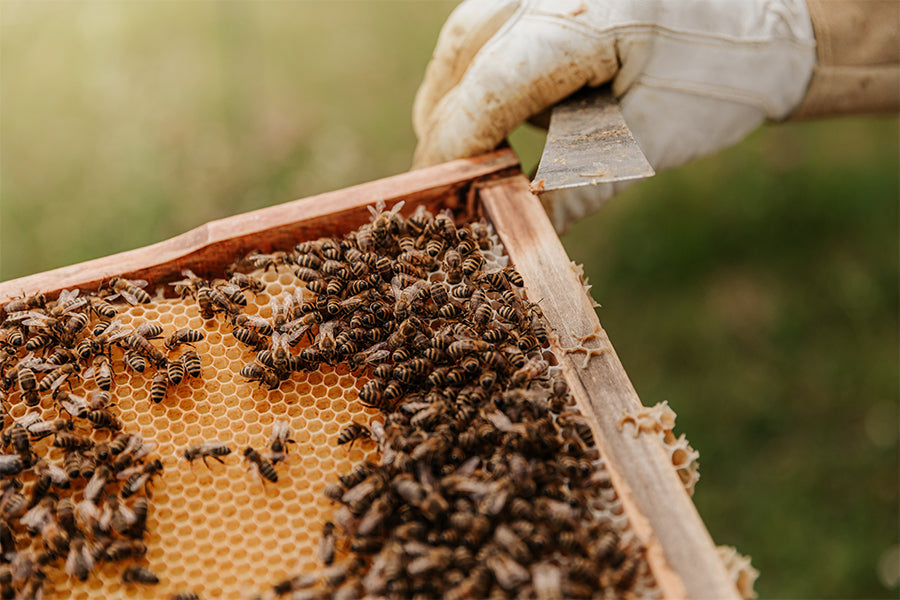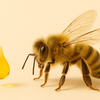Miha Larisi: We need to appreciate our work and our honey more

Miha Larisi is a beekeeper from Gorenjska, more precisely from Grabče. He is a great lover of nature and animals. We spoke on the phone just as he was finishing his chores at the bees. We talked about his beginnings in beekeeping, gaining knowledge and experience, people's awareness of the importance of bees and the quality of Slovenian honey.
How did your beekeeping story begin?
I started by planting fruit trees at home, but there were no bees. Then I decided, with a little encouragement from my wife's parents, to set up one bee colony for pollination. Thus, from one family, 14 families were created with me and 10 families with my wife's parents. This is not my primary activity, it is my hobby besides work.
So you started beekeeping out of necessity, if I understand correctly?
It wasn't even a need, it was more a curiosity. Here in our region, beekeeping is a very popular thing. So I have been surrounded by beekeeping since childhood and it has always been interesting to me. I also really like animals in general. Otherwise, I didn't get into beekeeping out of necessity. It's always been interesting to me, so seven years ago I started to get a little more serious about beekeeping.
Where did you first acquire your knowledge of beekeeping?
At first, I completed a course for beekeeping beginners organized by the Beekeepers' Association of Slovenia. I have to say I got quite a lot of useful information there. On the other hand, I read a lot of books, including some beekeeping forums, but I abandoned them, because they confuse people more than they teach anything smart.
Considering that I have a distribution system and I don't have traditional beehives that are typical for Slovenia, I didn't have any mentor. I mostly taught myself through books and the internet. Among other things, I was also reading a book by a very famous and successful beekeeper, in which I found a quote that I really liked. A beekeeper does something and thinks the bees will do it that way, but the bees always do their own thing. After all, this is a wild animal that no one has yet domesticated.
You were with the bees this morning. What are the tasks at the apiary during these times?
Bees are currently undergoing accelerated development. They need to be properly prepared before grazing. Bee colonies expand in the brood area, on which hive do we put the honeycombs, we prevent brooding... Although brooding is a beautiful natural phenomenon, it is half undesirable for the beekeeper when we do not want to increase the number of bee colonies.
BASIC VOCABULARY OF BEEKEEPING
BEE FAMILY: is a community of bees that are in one hive. A bee family has one queen, worker bees and trotters. One hive usually has from 5 thousand bees in winter, up to 70 thousand bees at the peak.
BEE BREEDING: is the natural reproduction of bee colonies. In doing so, the family is divided into two parts. One part stays in the hive and the other part leaves the hive.
What is your favorite job of the year?
Of course, the favorite task is pouring honey, because then we know that our whole year's effort is at least a little rewarded. This is surely the goal of every beekeeper. A swarm is also a wonderful experience when you see all the black bees in front of the apiary. But surely pouring honey is the most awaited and beautiful event. The past two years were otherwise very bad. I produced so much honey that we could sweeten ourselves a little at home and maybe have another glass for friends and acquaintances.
It would also touch upon the awareness of bees and beekeeping among the general public. What is your opinion on this?
This is a matter that needs to be delved into . Many people think that honey is such a wonderful thing, but the sad truth is that the food most often counterfeited is honey. These are mostly sugar solutions, often cornstarch, which bees turn into fake honey somewhere in China. This 'honey' comes here at a very low price, and we buy it in stores for €10.
That's exactly what I wanted to ask you about. Are Slovenians aware of what we are buying and what is the value of Slovenian honey?
There is very little awareness of this. The problem is with the beekeepers themselves. You can hardly find Slovenian honey under €18 in the store. Many beekeepers sell their honey for €6. But now the question is: do beekeepers do not value their work or are they selling quasi-honey.
I think it is extremely important that beekeepers start appreciating their work and value their harvest accordingly. The Beekeeper's Association also has published price recommendations, which I follow. I sell my honey from €12 onwards.
There is also a strong initiative to change the labeling on the jars. Jars often say 'a mixture of EU and non-EU honey'. Inside here hides fake honey from all over the world. The beekeeping association, together with the ministry, is striving for greater transparency, where the actual countries of origin would be indicated. This would also encourage the buyer to question which honey he is going to buy - whether it will be honey of known origin or some mixture of honey of questionable origin.
I always keep in mind that honey comes first for me and my children.
I really liked when you mentioned that you are one of the few who take a more organic approach to beekeeping.
That's right. Otherwise, I do not have a certificate and I have no intention of obtaining one. There are a lot of costs and paperwork associated with this. Maybe sometime in the future if I increase production.
But now I have in mind above all that this honey is in the first place for me and my children. Therefore, it is important to know that honey does not contain anything harmful. This is my main guide.
Finally, I want you to share with us one interesting fact that you think too few people know about.
Ugh, that's a pretty tough question. Maybe I would just say that we don't realize how powerful and valuable nature is. We appreciate too little and trash too much.




